|
|
|
Sort Order |
|
|
|
Items / Page
|
|
|
|
|
|
|
| Srl | Item |
| 1 |
ID:
134376
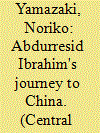

|
|
|
|
|
| Summary/Abstract |
An eminent Russian-Tatar alim (a scholar, or an intellectual) and Pan-Islamist known for his role as a collaborator in Japan's Islamic campaigns in the first half of the 20th century, Abdürreşid İbrahim went on a grand tour of Eurasia from 1907 to 1909. This article focuses on his journey to China in the late Qing by drawing mainly on his travel book Âlem-i İslâm, in which he describes China's politics, society, economy and culture, as well as the Muslims dwelling there, anticipating that Chinese Muslims would join in an alliance with Japan to form an anti-imperialist corridor. In general, İbrahim succeeded in enjoying Muslims' favour in Beijing, lamenting the place of Islam in China while also being scathingly critical of its practice. He was invited to Japan again in the 1930s and played an important role in drawing foreign Muslims' attention to Japan.
|
|
|
|
|
|
|
|
|
|
|
|
|
|
|
|
| 2 |
ID:
134375
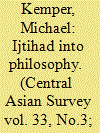

|
|
|
|
|
| Summary/Abstract |
Starting in 1960, authors of various Daghestani nationalities initiated a re-evaluation of the role of Islam in the history of Daghestan. An important historical personality to draw upon was Muhammad al-Quduqi, a Daghestani Islamic legal scholar of the late seventeenth and early eighteenth centuries. Quduqi was known for his sympathies towards ijtihad (Islamic legal reasoning by analogy) and for his call to replace customary law by Islamic law. This article studies how Quduqi was brought back into Soviet discourse in 1960, and how his advocacy for ijtihad was subsequently interpreted in Marxist terms as a quest for philosophy, rationalism and progress, with secularizing terms drawn from the discourse of Daghestani Jadids of the 1920s and 1930s. A comparison is then made with Soviet Tatarstan, where Marxist historians constructed a similar autochthonous trajectory of Tatar-Islamic progress and enlightenment. In both cases, Islamic concepts were taken out of context and used for the construction of a secularized national Muslim cultural heritage (miras) that would prepare the ground for socialism – with the difference that in Daghestan, this Muslim Mirasism was multi-ethnic in character.
|
|
|
|
|
|
|
|
|
|
|
|
|
|
|
|
| 3 |
ID:
134372
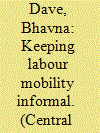

|
|
|
|
|
| Summary/Abstract |
Kazakhstan's legal–regulatory framework provides for a small number of quotas for highly skilled foreign workers but has no provisions for legal employment of semi-skilled or low-skilled migrants from the Central Asian states, who enter under the Commonwealth of Independent States (CIS) visa-free regime and work informally in construction, household and service sectors. The lack of acknowledgement of the scale of informal labour migration has denoted an act of strategic neglect on the part of the state, allowing it to render migrant labour illegal, disposable, and keep migrants legally and statistically invisible. Unable to obtain a legal status, migrants nominally comply with the existing legal framework as they also circumvent and subvert it. The article details the entrenched informal regime of labour migration and explains why recent efforts to ‘legalize’ labour through the introduction of a labour patent (licence), as is the case in Russia, are unlikely to bring in significant reforms.
|
|
|
|
|
|
|
|
|
|
|
|
|
|
|
|
| 4 |
ID:
134374
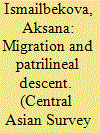

|
|
|
|
|
| Summary/Abstract |
Migration processes in Kyrgyzstan have given rise to fundamental social and demographic changes, meaning that many villages and town quarters are inhabited nowadays solely by women, children and the elderly, whereas younger and middle-aged men live as migrants elsewhere. This article explores the role of women in the maintenance of a strong patrilineal descent system, in the absence of their husbands or sons. This is achieved by grandmothers who play a significant role in transmitting oral genealogies and passing stories on to their children. Another role of women lies in changing the names of male relatives of their husbands; while appointing whom one should marry is also of great importance. The role of mothers-in-law in the formation of their sons' marriage ties in the latter's absence points to the powerful positions of these women. The final point is that young brides continue to live with their parents-in-law – even if their husband does not – and they must be respectful brides.
|
|
|
|
|
|
|
|
|
|
|
|
|
|
|
|
| 5 |
ID:
134373
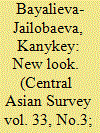

|
|
|
|
|
| Summary/Abstract |
Non-governmental organizations (NGOs) in post-Soviet Kyrgyzstan have become visible players in the social and political scene. However, despite being portrayed as professional organizations in the literature, the professionalization of NGOs in Kyrgyzstan has been understudied. This article aims to rectify this gap. It presents and discusses the findings of a study analysing NGOs from an organizational perspective using semi-structured interviews with 45 NGOs, self-administered questionnaires with their leaders and employees, and observation of their working environment. The key conclusion is that the NGO sector can be described as semi-professional. NGOs use different tactics to achieve efficiency and effectiveness. However, they face such challenges as limited funding, high staff turnover and poor coordination. The article provides an account of the NGO sector by mapping it into professional and non-professional groups that can serve as a new benchmark for better understanding NGOs in Kyrgyzstan.
|
|
|
|
|
|
|
|
|
|
|
|
|
|
|
|
| 6 |
ID:
134370


|
|
|
|
|
| Summary/Abstract |
Afghanistan is often mentioned as a threat to the Central Asian states. Potential spillovers of violence, extremism, terrorism and dangers related to the drug trade are seen as significant security issues for the region. This article takes a different approach. Taking a performative view of statehood, we see state identities as socially constituted, partly by involvement in regional and global processes. From research on border management, the Northern Distribution Network, and various forms of bilateral cooperation between Afghanistan and the Central Asian states, we argue that Afghanistan has become an arena where the Central Asian states can participate. How the Central Asian states bordering on Afghanistan are treated as relevant participants, regardless of actual state capacity or the effectiveness of their policies, serves to constitute and confirm their sovereignty and relevance to the international community, and ultimately their statehood. By emphasizing the important state effects of their performance, our perspective differs from accounts of Central Asian states as either ‘weak’ or ‘strong’, and the tendency to depict Central Asian engagement in regional initiatives as mere window-dressing.
|
|
|
|
|
|
|
|
|
|
|
|
|
|
|
|
| 7 |
ID:
134369
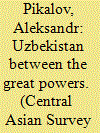

|
|
|
|
|
| Summary/Abstract |
The expulsion of US forces from the Karshi-Khanabad airbase in November 2005 and the subsequent rapprochement between Uzbekistan and Russia represents one of the most dramatic diplomatic turnabouts in Uzbek foreign policy. This article analyses the theoretical discourses surrounding the alignment behaviour of Uzbekistan. It posits that traditional alignment theories, such as balance of power and balance of threat, are inadequate in their explanations of Uzbek foreign policy due to the lack of attention paid to the nature of the regime and the internal politics of the country. It also dismisses previous attempts at characterizing Uzbekistan's alignment behaviour as ‘omnibalancing’ as inadequate and incomplete. This article argues that Uzbekistan's foreign policy is based on a multi-vectorial approach, which is designed to maximize the benefits that a particular alliance may offer Uzbekistan. A variety of sources have been consulted in the formulation of this work, from official Uzbek foreign policy statements to secondary sources, in both English and Russian.
|
|
|
|
|
|
|
|
|
|
|
|
|
|
|
|
| 8 |
ID:
134371
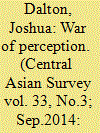

|
|
|
|
|
| Summary/Abstract |
The international community and the Afghan government tout the expansion of domestic media in post-2001 Afghanistan as an indication of progress. However, much of Afghan media has been appropriated by powerful ex-warlords to expand their influence and maintain their grip on power. Jamiat-e Islami and Hezb-e Islami – former jihadist groups who continue to wield considerable political influence within the country – are fierce rivals currently wielding their affiliated media outlets to wage a propaganda war against each other. Each seeks to justify its own right to power and to delegitimize the opponent – ratcheting up tension in a country whose future after 2014 remains precarious and uncertain. This study examines the media campaign of each group, analyzing the salient narratives in their media messages, the intended audiences of these narratives, and what the narratives tell us about the intents and concerns of each group.
|
|
|
|
|
|
|
|
|
|
|
|
|
|
|
|
|
|
|
|
|